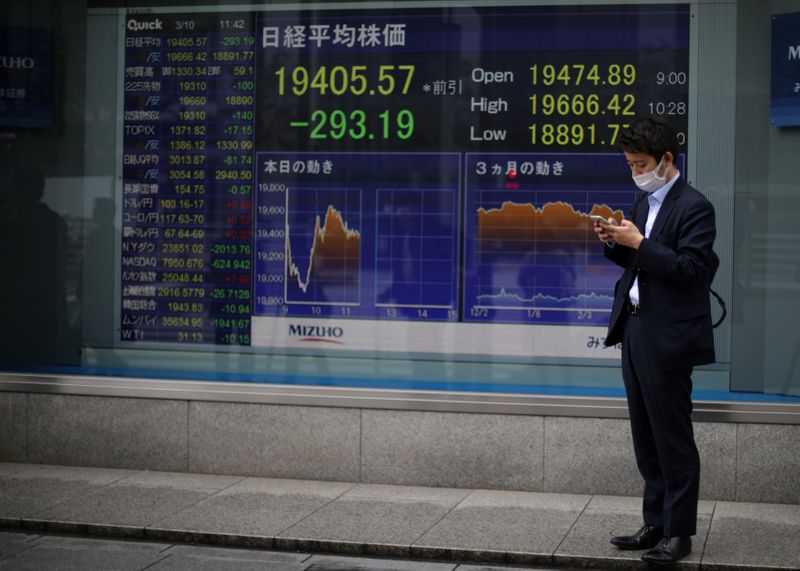By Wayne Cole and Sumeet Chatterjee
SYDNEY/HONG KONG (Reuters) - Asian stocks bounced, and bond yields rose from record lows on Tuesday on hopes that global policymakers would introduce co-ordinated stimulus to cushion the economic impact of a coronavirus outbreak.
U.S. and European markets were expected to follow the Asian lead with major stock futures trading up more than 2%.
Oil similarly clawed back some of its massive losses from Monday, rallying 7% and offering hope that markets had found a floor, although sentiment was still fragile a day after prices plunged.
Yields on benchmark U.S. 10-year Treasury debt more than doubled to 0.70% as investors pared some of their heavy safe-haven holdings.
Supporting the mood was a pledge from President Donald Trump on Monday to take "major" steps to protect the economy and float the idea of a payroll tax cut with congressional Republicans.
"Talk of coordinated fiscal and monetary support is getting louder," said Rodrigo Catril, a senior FX strategist at National Australia Bank.
U.S. stock futures, the S&P 500 e-minis, were up 3.43% at 2,842.
In early European trades, the pan-region Euro Stoxx 50 futures were up 2.72% at 3,056, German DAX futures were up 2.41% at 10,943.5, FTSE futures were up 3.14% at 6,178.5.
The gains in the U.S. and European futures come on the back of a 1.36% rise in MSCI's broadest index of Asia-Pacific shares outside Japan, having dropped more than 5% on Monday.
Despite the bounce, analysts warned it was too early to call a trough in equity markets.
"In fact, very high volatility in equities will persist in the coming weeks as the viral outbreak accelerates outside of China and policy makers race to find a concerted response to get ahead of the curve in markets," Michael Strobaek, global chief investment officer at Credit Suisse (SIX:CSGN), wrote in a research note.
ASIAN GAINS
Japan's Nikkei ended the day up 0.85%, after touching its lowest level since April 2017 earlier in the day. Japan will unveil a second stimulus package later on Tuesday to offset the impact of the outbreak. (T)
Australia closed up 3.1% as some went hunting for bargains in beaten down stocks.
China's benchmark Shanghai Composite Index was trading up 1.7% as new domestic coronavirus cases tumbled and President Xi Jinping's visit to the epicenter of the epidemic lifted sentiment.
Headlines on the coronavirus, however, were still no brighter with Italy ordering everyone across the country not to move around other than for work and emergencies, while banning all public gatherings.
"Although uncertainty is very high, we now expect similar restrictions will be put in place across Europe in the coming weeks," warned economists at JPMorgan (NYSE:JPM).
"We are now expecting a rolling 1H20 global growth contraction and a powerful global disinflationary wave to take hold," they added. "We expect the Fed to cut to zero at or before its March 18 meeting."
Benchmarks Brent crude futures and U.S. West Texas Intermediate (WTI) crude bounced back after having recorded their biggest one-day percentage declines since January 1991 on Monday. [O/R]
Gold prices fell 1%, retreating from the last session's jump above the key $1,700 level, as safe-haven demand waned a little amid speculation of global stimulation measures. [GOL/]
ONUS ON CENTRAL BANKS
Such has been the conflagration of market wealth that analysts assumed policy makers would have to react aggressively to prevent a self-fulfilling economic crisis.
The U.S. Federal Reserve on Monday sharply stepped up the size of its fund injections into markets to head off stress.
Having delivered an emergency rate cut only last week, investors are fully pricing an easing of at least 75 basis points at the next Fed meeting on March 18, while a cut to near zero was now seen as likely by April. <0#FF:>
Britain's finance minister is due to deliver his annual budget on Wednesday and there is much talk of coordinated stimulus with the Bank of England.
The European Central Bank meets on Thursday and will be under intense pressure to act, even though rates there are already deeply negative.
"Italy's decision to quarantine the whole country will affect 15% of Europe's GDP, putting thee ECB at the forefront of efforts to cushion the escalating economic deterioration," said Brian Martin, a senior international economist at ANZ.
Bonds had charged ahead of the central banks to essentially price in a global recession of unknown length.
Yields on 10-year U.S. Treasuries reached as low as 0.318% on Monday - a level unthinkable just a week ago - but rose back to be last at 0.6818% on Tuesday amid the stimulus chatter.
That in turn helped the dollar recoup some of its recent hefty losses to reach 104.70 yen, edging away from Monday's three-year trough around 101.17.

The euro eased back to $1.1351, after climbing 1.4% on Monday to the highest in over 13 months at $1.1492.